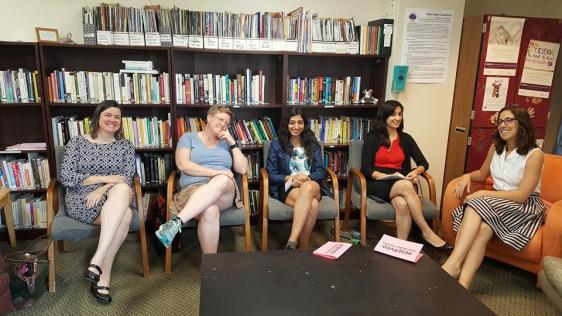(In)Visible Disabilities and Women Resources Round-up
A resource round-up provided by Women’s Center staff members Meagé and MJ
In case you missed Tuesday’s roundtable on (In)Visible Disabilities and Women (or if you were there and want to keep the conversation going), we thought it might be useful to summarize some of the discussion in addition to linking some useful reading materials and resources.

As with all of our roundtables, we reached out to our panel members and asked them to keep a few guiding questions in mind as they shared their stories and examples. Some of these included:
-
Where do the intersections of (in)visible disabilities and gender show up for you personally? In the classroom, peer networks, etc.?
-
How does disability relate to issues like reproductive justice, sexual violence, or gender socialization?
-
How is the way we talk about disability influenced by gender and sexuality?
-
How does ableism impact women with visible vs. invisible disabilities differently?
-
Why is this a social justice and/or feminist issue?
On Tuesday, our panelists shared their definitions and experiences of disabilities and their intersection with gender. Rina Rhyne of Voices Against Violence, elaborated on the array of sexual assault/violence perpetrated towards people with disabilities. “Sexual violence is not always physical. Caretakers and partners can manipulate the power and control they hold in relationship.” (See the Power and Control Wheel: People with Disabilities and their Caregivers) Dr. Julie Murphy spoke to the ways in with ADHD are diagnosed (or not) and the ways in which gender socialization impact the ways in which people respond or react to with women with ADHD. Dr. Kate Drabinski reflected on teaching disability studies and encouraged us to learn more about the social model of disability. Student Leader, Prachi, shared her experience as a Deaf student here at UMBC. She explained the duality of deafness, “it is both an invisible and visible disability.” Prachi also spoke to what it means to be Deaf as a woman of color and called for a change in the way we view disabilities saying, “deafness is not ugly nor is it negative.”
With only an hour to spend together, there’s still so much more we could have discussed and learned together. Below are just a few resources to help us continue to engage in self-reflection and growth.

Thanks to our panel members for the important and rich conversation!
From Stuff Mom Never Told You
From Everyday Feminism
- How Mainstream Feminism Continues to Perpetuate Ableism (And How We Can Change That)
- I’m Not a Person with a Disability. I’m an Disabled Person
- 4 Ways to Be an Ally to People with Invisible Disabilities
News and other articles
- #SolidarityIsForTheAbleBodied, and Feminism’s Ableism Problem
- The hidden victims of campus sexual assault: Students with disabilities
- The Place of Women with Disabilities in Feminist Movements
Helpful Legal Services/ Information on Disability Rights and Accommodations
- Maryland Disability Law Center
- U.S. Equal Employment Opportunity Commission
- Pro Bono Resource Center – Maryland
- Maryland Volunteer Lawyers Service
- JAN Network – Job Accommodation Network
- ADA – Americans with Disabilities Act
- Rape,Abuse & Incest National Network: Sexual Abuse of People with Disabilities
- Power & Control Wheel:People with Disabilities and their Caretakers
On-campus Resources
- Student Disability Services
- AOK Library Assistive Technology
- UMBC Counseling Center
- Voices Against Violence
Read more from other roundtable roundups:
Trans Identities + Mental Health (March 2016)
Black Trauma + Mental Health (February 2016)
White Womanhood + Critical Whiteness (September 2015)
Posted: April 21, 2016, 11:33 AM